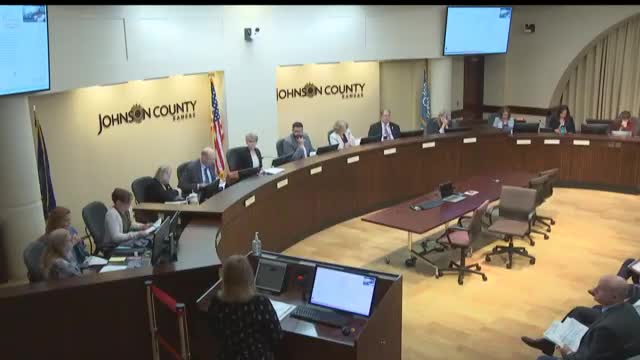County recommends $25 million stormwater program for 2026; funds planning, system management and flood projects
October 03, 2025 | Planning Commission, Johnson County, Kansas
This article was created by AI summarizing key points discussed. AI makes mistakes, so for full details and context, please refer to the video of the full meeting. Please report any errors so we can fix them. Report an error »

Johnson County’s stormwater management staff on Oct. 2 presented a recommended 2026 expenditure plan of $25,013,842 funded by the program’s dedicated one‑tenth‑of‑1‑percent sales tax, with the stormwater management advisory council’s support.
Why it matters: The program cost-shares stormwater and flood-reduction projects with cities, funds planning and watershed master plans, and supports regulatory compliance activities that cities can use to meet state permit requirements.
What staff proposed: Heather Schmidt, stormwater program manager, said total funds available for 2026 are just over $26 million; about $1,000,000 is budgeted for administrative services and roughly $25,000,000 is available for capital projects. Proposed allocations include roughly $4.6 million for planning and support (studies, watershed master planning, regional partnering and monitoring such as the rain-gauge and stream-gauge network), approximately $11,500,000 for system management projects (condition assessments and 50% cost-shared system replacements), $7,700,000 for watershed-improvement projects (water quality and voluntary home buyouts, plus the contain‑the‑rain public-education credit program), and several flow/flood-risk reduction projects across four cities including a multi‑year Merriam/Corps of Engineers effort and a new Desoto project slated to begin in 2026.
Board questions and direction: Commissioners asked for follow-up briefings on specific projects, including Upper Turkey Creek in Merriam and upstream impacts. Staff said Merriam is cooperating with the U.S. Army Corps of Engineers and that Congress has appropriated design funds; the design is expected to be about 60% complete this fall. Commissioners also asked to meet with staff before the Oct. 9 action meeting to discuss district-specific concerns.
Next steps: The stormwater program will be bundled with the CARS program for the Oct. 9 meeting and be presented for approval. No formal board vote occurred at the Oct. 2 agenda review.
Ending: Staff will provide additional briefings to commissioners on specific watershed projects and related interjurisdictional issues before the Oct. 9 meeting.
Why it matters: The program cost-shares stormwater and flood-reduction projects with cities, funds planning and watershed master plans, and supports regulatory compliance activities that cities can use to meet state permit requirements.
What staff proposed: Heather Schmidt, stormwater program manager, said total funds available for 2026 are just over $26 million; about $1,000,000 is budgeted for administrative services and roughly $25,000,000 is available for capital projects. Proposed allocations include roughly $4.6 million for planning and support (studies, watershed master planning, regional partnering and monitoring such as the rain-gauge and stream-gauge network), approximately $11,500,000 for system management projects (condition assessments and 50% cost-shared system replacements), $7,700,000 for watershed-improvement projects (water quality and voluntary home buyouts, plus the contain‑the‑rain public-education credit program), and several flow/flood-risk reduction projects across four cities including a multi‑year Merriam/Corps of Engineers effort and a new Desoto project slated to begin in 2026.
Board questions and direction: Commissioners asked for follow-up briefings on specific projects, including Upper Turkey Creek in Merriam and upstream impacts. Staff said Merriam is cooperating with the U.S. Army Corps of Engineers and that Congress has appropriated design funds; the design is expected to be about 60% complete this fall. Commissioners also asked to meet with staff before the Oct. 9 action meeting to discuss district-specific concerns.
Next steps: The stormwater program will be bundled with the CARS program for the Oct. 9 meeting and be presented for approval. No formal board vote occurred at the Oct. 2 agenda review.
Ending: Staff will provide additional briefings to commissioners on specific watershed projects and related interjurisdictional issues before the Oct. 9 meeting.
View full meeting
This article is based on a recent meeting—watch the full video and explore the complete transcript for deeper insights into the discussion.
View full meeting
